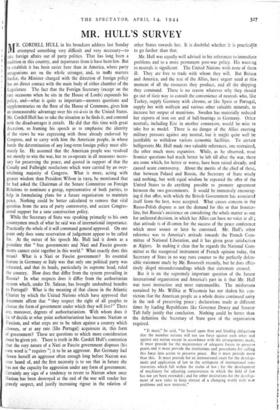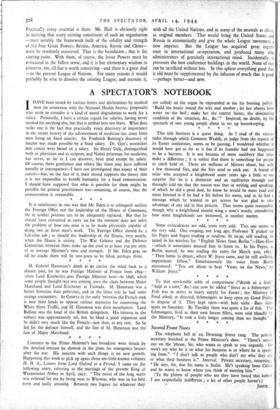MR. HULL'S SURVEY M R. CORDELL HULL in his broadcast address
Iasi Sunday attempted something very difficult and very necessary—to take foreign affairs out of party politics. That has long been a tradition in this country, and departures from it have been few. But to establish it has been easier here than in America, where party antagonisms are on the whole stronger, and, to Make matters harder, the Minister charged with the direction of foreign policy has no direct contact with the main body of either chamber of the Legislature. The fact that the Foreign Secretary (except on the rare occasions when he sits in the House of Lords) expounds his policy, and—what is quite as important—answers questions and supplementaries on the floor of the House of Commons, gives him an immeasurable advantage over his vis-a-vis in the United States. Mr. Cordell Hull has to take the situation as he finds it, and contend with the disadvantages it entails. He did that this time with great discretion, so framing his speech as to emphasise the identity of the views he was expressing with those already endorsed by Congress, and to carry with him the American people, in whose hands the determination of any long-term foreign policy must ulti- mately lie. He assumed that the American people was resolved not merely to win the war, but to co-operate in all measures neces- sary for preserving the peace, and quoted in support of that the Conally and Fulbright resolutions which were carried by an over- whelming majority of Congress. What is more, acting with greater wisdom than President Wilson in 1919, he mentioned that he had asked the Chairman of the Senate Committee on Foreign Relations to nominate a group, representative of both parties, to help in formulating plans for a future organisation to maintain peace. Nothing could be better calculated to remove that vital question from the area of party controversy, and secure Congres- sional support for a sane construction policy.
While the Secretary of State was speaking primarily to his own countrymen much of what he said was of international importance. Practically the whole of it will command general approval. On one point only does some reservation of judgement appear to be called for. At the outset of his speech Mr. Hull laid it dovin as a postulate that "free governments and Nazi and Fascist govern- ments cannot exist together in this world." What exactly does this mean? What is a Nazi or Fascist government? Its essential feature in Germany or Italy was that only one political party was tolerated, and that its heads, particularly its supreme head, ruled the country. How does that differ from the system prevailing in Russia? In what respects does it differ from the authoritarian system which, under Dr. Salazar, has brought undoubted benefits to Portugal? What is the meaning of that clause in the Atlantic Charter by which the United Nations which have approved that document affirm that "they respect the right of all peoples to choose the form of government under which they will live?" There are, moreover, degrees of authoritarianism. With whom does it lie decide at what point authoritarianism has become Nazism or Fascism, and what steps are to be taken against a country which chooses, of at any rate (like Portugal) acquiesces in, this form of government? These are questions to which more consideration must be given yet. There is truth in Mr. Cordell Hull's contention that the very nature of a Nazi or Fascist government disposes (his own word is "requires ") it to be an aggressor. But Germany had shown herself an aggressor often enough long before Nazism was ever heard of, and the first necessity is to see that in future she has not the capacity for aggression under any form of government. Certainly any sign of a tendency to revert to Nazism when once Nazism has been destroyed at the end of the war will render her gravely suspect, and justify increasing rigour in the relation of other States towards her. It is doubtful whether it is practicable to go farther than that.
Mr. Hull was equally well advised in his references to immediate problems and to a more permanent post-war policy. His warn:ng to neutr4ls is significant. The United Nations wish none of them ill. They are free to trade with whom they will. But Britain and America, and the rest of the Allies, have urgent need at this moment of all the resources they produce, and all the shipping they command. There is no reason whatever why they should go out of their way to consult the convenience of neutrals who, like Turkey, supply Germany with chrome, or like Spain or Portugal, supply her with wolfram and various other valuable minerals, to increase her output of munitions. Sweden has materially reduced her exports of iron ore and of ball-bearings to Germany. Other neutrals, including Eire in another connexion, would be-wise to take her as model. There is no danger of the Allies exerting military pressure against any neutral, but it might quite well be justifiable to withdraw various economic facilities. To certain belligerents Mr. Hull made two valuable references, one restrained, the other much more expansive. While, as he observed, most frontier' questions had much better be 'left till after the war, there are Some which, for better or worse, have been raised already, and caused acute controversy. About the merits of the chief of these; that between Poland and Russia, the Secretary of State wisely said nothing, but with equal wisdom he repeated the offer of the United States to do anything possible to promote agreement between the two governments. It would be immensely encourag- ing if that offer, with which the British Government has associated itself from the first, were accepted. What causes concern in the Russo-Polish dispute is not the demand for this or that frontier- line, but-Russia's insistence on considering the whole matter as one for unilateral decision, in which her Allies can have no voice at all ; that attitude is of ill-omen for the success of the peace conference which must sooner or later be convened. Mr. Hull's other reference was to America's attitude towards the French Com- mittee of National Liberation, and it has given great satisfaction at Algiers. In making it clear that he regards the National Com- mittee as the recognised instrument of French opinion today, the Secretary of State in no way runs counter to the perfectly defen- sible statement made by Mr. Roosevelt recently, but he does effec- tively dispel misunderstandings which that statement created.
But it is on the supremely important question of the future international organisation and America's part in it that Mr. Hull was most instructive and most statesmanlike. The misfortune sustained by Mr. Willkie at Wisconsin has not shaken his con- viction that the American people as a whole desire continued unity in the task of preserving peace ; declarations made at different times by leading Republicans like Governor Dewey and Senator Taft fully justify that conclusion. Nothing could be better than the definition the Secretary of State gave of the organisation required.
"It must," he said, "be based upon firm and binding obligations that the member nations will not use force against each other and against any nation except in accordance with the arrangements made. It must provide for the maintenance of adequate forces to preserve peace, and it must provide the institutions and procedures for calling this force into action to preserve peace. But it must provide more than this. It must provide for an international court for the develop- ment and application of law to the settlement of international con- troversies which fall within the realm of law ; for the development of machinery for adjusting controversies to which the field of law has not yet been extended ; and for other institutions for the develop- ment of new rules to keep abreast of a changing world with new problems and new interests." Practical:y every essential is there. Mr. Hull is obviously right in insisting that every existing constituent of such an organisation —most notably the framework built of the solidity and strength of .the four Great Powers, Britain, America, Russia and China— must be resolutely conserved. That is the foundation ; that is the starting-point. With them, of course, the lesser Powers must be associated in ;he fullest sense, and it is but elementary wisdom to conserve, too, all that is worth conserving—and there is a great deal —in the present League of Nations. For many reasons it would probably be wise to dissolve the existing League, and recreate it, with all the United Nations, and as many of the neutrals as chose. as original members. That would bring the United States and Russia in automatically and give the whole League movement a new impetus. But the League has acquired great experi- ence in international co-operation, and produced many able administrators of genuinely international mind. Incidentally, it possesses the best conference buildings in the world. None of that can be sacrificed without loss. In this sphere everything good that is old must be supplemented by the infusion of much that is good —perhaps better—and new.



























 Previous page
Previous page